Our Impact 2021/22
We work with secondary schools, colleges and employers to improve careers education and secure better outcomes for young people.
For more detail on our activities and plans to support the careers system further see our strategic priorities and Value for Money report.
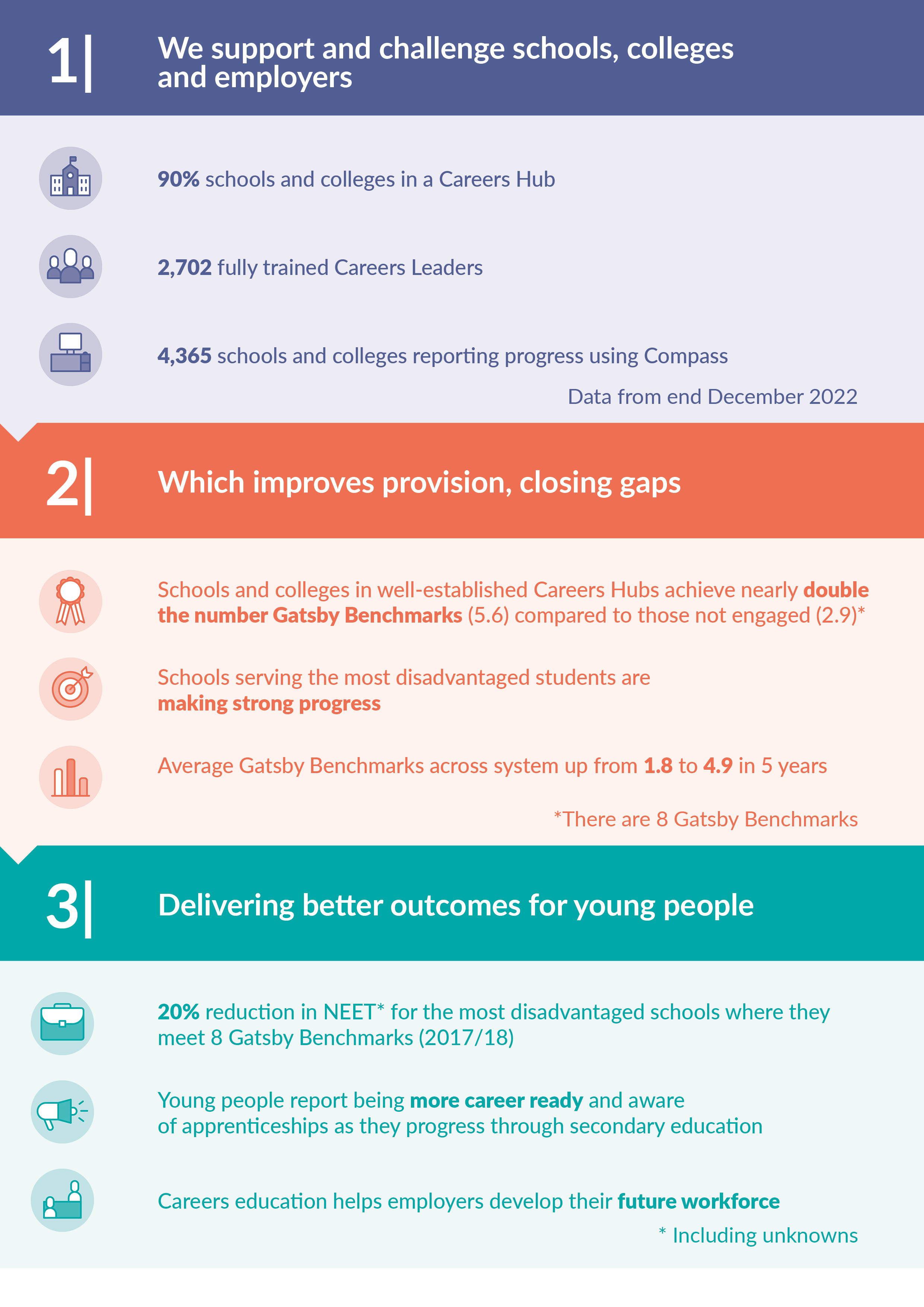
1. Supporting and challenging schools, colleges and employers
We work with secondary schools and colleges in England and have extended our reach over time. The vast majority of schools and colleges are now voluntarily working with us through accessing training for Careers Leaders, being members of Careers Hubs, partnering with business volunteers and using our Compass/Compass+ digital tools.
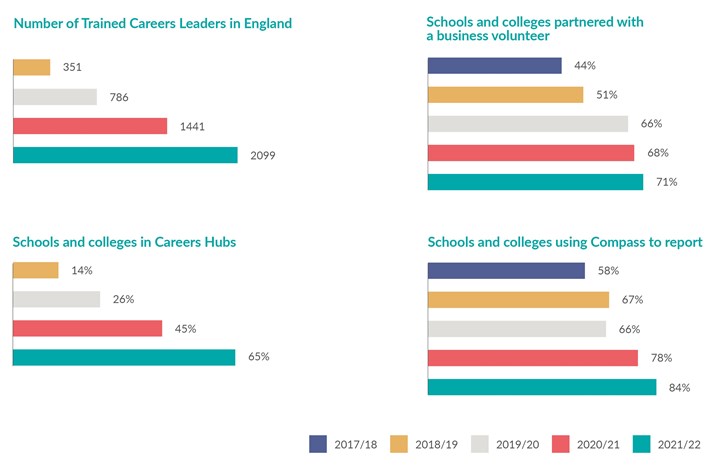
Source: Analysis of CEC returns data, end March 2022
External evaluations of Careers Leader training, Careers Hubs and the wider network have established the positive impact of these interventions over time.
CEC analysis of sub-benchmark data, following our previously published methodology, suggests that 93% of young people in the 4,200 schools and colleges that reported last year received at least one employer encounter.
2. Improving provision, closing gaps
The closer schools and colleges work with us, the faster reported provision improves (as judged by the Gatsby Benchmarks, the international standard of best practice). Schools and colleges in Careers Hubs achieve a higher number of benchmarks compared to those who don’t engage. Well established Careers Hubs are supporting the most progress.
Average number of Gatsby Benchmarks achieved by schools and colleges, 2021/22*
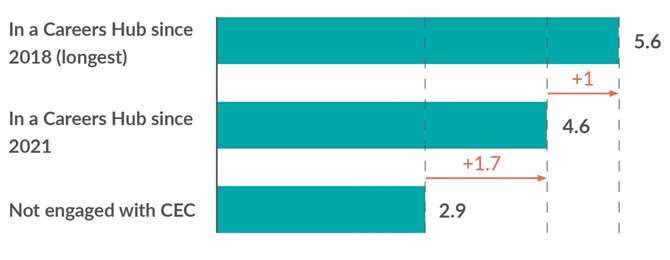
*Total possible = 8
Source: Analysis of Compass data, end July 2022
For more detailed information about progress against the Gatsby Benchmarks in 2021/22 see our latest Insight briefing and Compass data.
We work more closely with schools serving the most disadvantaged young people.
% mainstream schools engaging in the careers system according to level of disadvantage
(Quartiles based on % pupils eligible for Free School Meals, end July 2022)
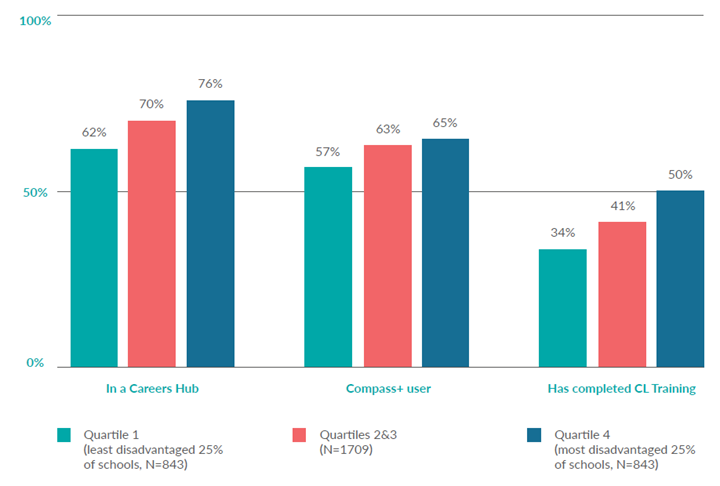
Source: Analysis of Compass+ and CEC management data, end July 2022 (Compass+ enables more granular reporting)
As a result, careers education is strengthening in schools serving the most disadvantaged young people.
Increase in average number of Gatsby Benchmarks achieved by mainstream schools 2018/19-2021/22
(Quartiles based on % pupils eligible for Free School Meals, end July 2022)
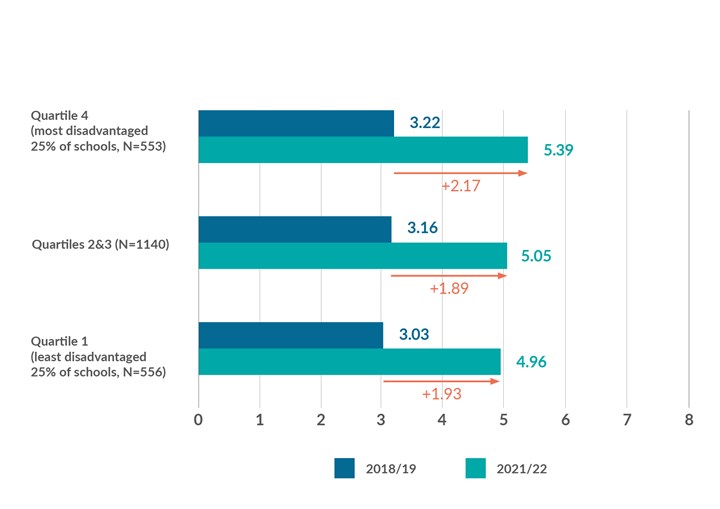
Source: Analysis of Compass+ data, end July 2022 (Compass+ enables more granular reporting)
3. Delivering better outcomes for young people
The more benchmarks a school meets, the more likely young people are to be in a sustained destination post-16. This is particularly true for young people eligible for Free School Meals. Better Gatsby Benchmark provision is also associated with higher apprenticeship uptake.
Evidence from the 2017/18 school leavers shows that, in schools serving the most disadvantaged cohorts, each benchmark met led to a 2.8% reduction in the proportion of young people not in a sustained destination after Year 11. This equates to a 20.1% decline where all benchmarks were met. The resulting decline would save the Exchequer £150m per year. Our latest technical note confirms the relationship between good career provision and sustained destinations.
Careers provision in schools is helping young people become more ready for the future as they get older. 2021/2022 was the first year our Future Skills Questionnaire was in operation. 34,986 young people responded and reported:
Young people’s career readiness responses in schools 2021/22
|
|
Year 7 |
Year 11 |
|
Overall career readiness score* |
45% |
67% |
|
Knows what skills employers need |
63% |
79% |
|
Understands apprenticeships vs A-levels |
39% vs 46% |
81% vs 88% |
|
Has thought about which pathway might be right for them |
24% |
85% |
|
Has a plan for next step |
N/A |
86% |
*Average proportion of career knowledge and skills questions answered positively by students
Source: Year 7 and Year 11 student responses to the Future Skills Questionnaire (collected through Compass+) during the 2021/2022 academic year.
Employers are recognising the value of careers education. Our 2020/21 survey of Cornerstone Employers shows:
- Over four in five said that working directly with schools and colleges on their careers’ education programmes had helped them to develop their talent and skills pipeline.
- Approximately two-thirds reported that they recruited young people who had been on their work experience or placement programme.
Our recent survey of our Enterprise Adviser business volunteers indicates:
- Over three quarters agreed the Enterprise Adviser programme is a cost-effective way to improve business engagement with schools and colleges.
- Over four fifths would recommend the role to someone else
For more information about the evidence base for our impact, please read our submission to the Education Select Committee Inquiry into Careers Education, Information, Advice and Guidance.
For our latest report, bringing together a range of evidence to answer key questions for the careers system, see Ready for the Future: A review of Careers Education in England 2021/22.
Find out more
For more detailed information about progress against Gatsby Benchmarks in 2021/2022, read our Insight briefing.
Read more